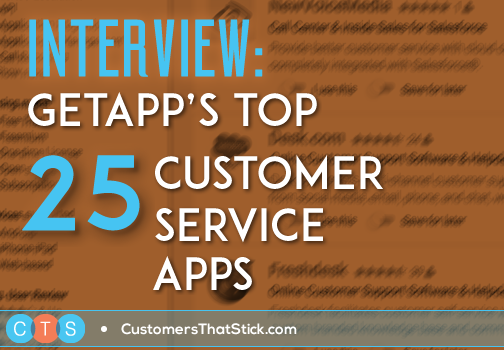
Suzie Blaszkiewicz is a market analyst and content editor for GetApp.
GetApp offers a digital comparison tool of customer service software and recently published a report on the Top 25 Customer Service Apps.
Suzie speaks with us about the methodology behind the study and some of the surprising results. If you’re interested in customer service software, make sure to check out the interview.
You recently published a report on the Top 25 Customer Service apps on the market today. What methodology did you use to determine this?
“Our ranking uses five unique data points to create a Top 25 list that provides a snapshot of the leading options for customer service software for small and mid-sized businesses.
 These data points are reviews, integrations, mobile app availability, media presence, and security.
These data points are reviews, integrations, mobile app availability, media presence, and security.
Reviews looks at the number and rating of reviews on GetApp, giving a sense of user perception of the application.
Integrations is based on the number of integrations listed on GetApp, giving a better idea of the maturity of a product and how it might integrate with other common software that’s already being used.
Mobile app availability pulls data from Google Play and the App Store to see an app’s rating in both stores.
Media presence uses followers and fans from Facebook and Twitter to discern the relative popularity of an app.
Security is based on a vendor-completed security survey comprising 15 questions.
Each of these data points is scored out of 20, for a total possible score out of 100.”
I found it interesting that LiveChat Inc. ranked above Salesforce’s Desk.com… What were the reasons the results stacked up this way?
“Salesforce’s Desk.com application is certainly a popular solution and one of the market-leaders, and as such, gets high marks across the board. The ranking, however, also focuses on user perception, which comes into play with reviews and mobile app scores. LiveChat has over 100 5-star reviews on GetApp with an average overall score of 4.8, while Desk.com has a still-impressive score of 4.3.
Each review on GetApp is vetted for accuracy and certified via LinkedIn, so having that many 5-star reviews is quite striking. LiveChat also scores slightly higher (in terms of user rating) for its Android app, as well as having good transparency with its security measures, giving it that extra edge to take the top spot.
That being said, both are excellent solutions for businesses of all sizes.”
It seems like dedicated customer service software may not yet be the industry standard. Have you found that this is the case?
“Customer service software adoption is slowly starting to pick up steam, but you’re right: it’s not quite the industry standard just yet. According to a recent study, only 14 percent of software buyers in this field are using a dedicated customer service and support (CSS) solution.
The majority (52 percent) are opting instead for manual methods including email, spreadsheets, or even pen and paper in place of a CRM system to track and handle their customer service efforts.
Essentially, more than half of customer service reps have been doing things manually, which opens them up to a whole host of potential issues that could stem from human error. This antiquated method of record keeping and reporting provides virtually no visibility to colleagues or management within a business.”
Why do you think the adoption rate for CSS software is so low?
“There’s always hesitation when moving into unchartered territory, especially when any type of technology is involved. When it comes to those still using manual methods, making the switch from any type of legacy process is always daunting for first-time buyers and could deter small teams from wanting to train on new systems.
For those using a CRM or other types of software to manage customer support, there might be the ill-perceived notion that a dedicated CSS software is not necessary. The desire for specialized functions, however, is evident, with 90 percent of all potential CSS software buyers requesting basic ticket management as a necessity for customer service and support.
It’s often the case that a CRM just doesn’t meet all of a customer service professional’s needs, falling short when it comes to functionality.”
If a customer service rep is used to the way they’re doing things, even if that’s using manual methods, why even make the switch to software?
“The best way of answering this is with data. Of those businesses still using manual methods to handle their customer service and support, 64 percent say that they’d consider software in order to be able to better manage customer complaints.
This shows that even if a customer service rep is accustomed to doing things a certain way, they recognize the value in having a dedicated solution to help them better perform their jobs.
Things like basic ticket management, reporting and analytics functions, and a history of customer interactions not only help to better manage the customer service process, but also make a rep’s job more streamlined and allow them to provide better and more accurate customer support.”
Not all software is created equal, as your ranking report showed… What steps should those in the customer service industry take to ensure they’re selecting the right kind of CSS software for their specific needs or pipeline?
“For business owners, once you get an idea of the top-rated software solutions from the ranking or from your own research, you’ll have to look at other factors to make sure that you choose the right solution for your organization. A few things to consider when it comes to CSS software include:
Features and functionality: Some CSS software has more robust features than others. One isn’t necessarily better than the other, but rather, it’s dependent on what your company needs. Take a look at an app’s feature-set to make sure that it has everything that your company needs without weighing down your customer service reps with functions they won’t use.
Multi-channel support: Make sure that it supports all of the outlets from which your customer normally contacts you, including phone, email, live chat or social media touch points. If your customer accesses the channel, you’ll want it to be a part of your new software.
Company size: Choose a solution that’s built for your company, but also one that’s scalable so that if (and ideally when) your company does grow, your software can grow with it.
Price: The price of customer service solutions can vary quite significantly. Take a look to see which pricing model makes sense for your company and the number of employees that will be using it.
Integrations: Check to see that it integrates with other software that you’re using, especially your CRM, to ensure that all of your customer interactions are in one place.
When a businesses considers all of these factors in choosing the right customer service software for their needs, they should be able to confidently move forward with a purchase and start making things a lot more streamlined.”
Comments have been closed on this post.
© 2011-2023 CTS Service Solutions, LLC.
All rights reserved.
Legal Information | Privacy Policy
How to Cite this Site
Pingback: 264: (Tip) Mobile Potential
Pingback: 270: John-Paul Narowski, KarmaCRM